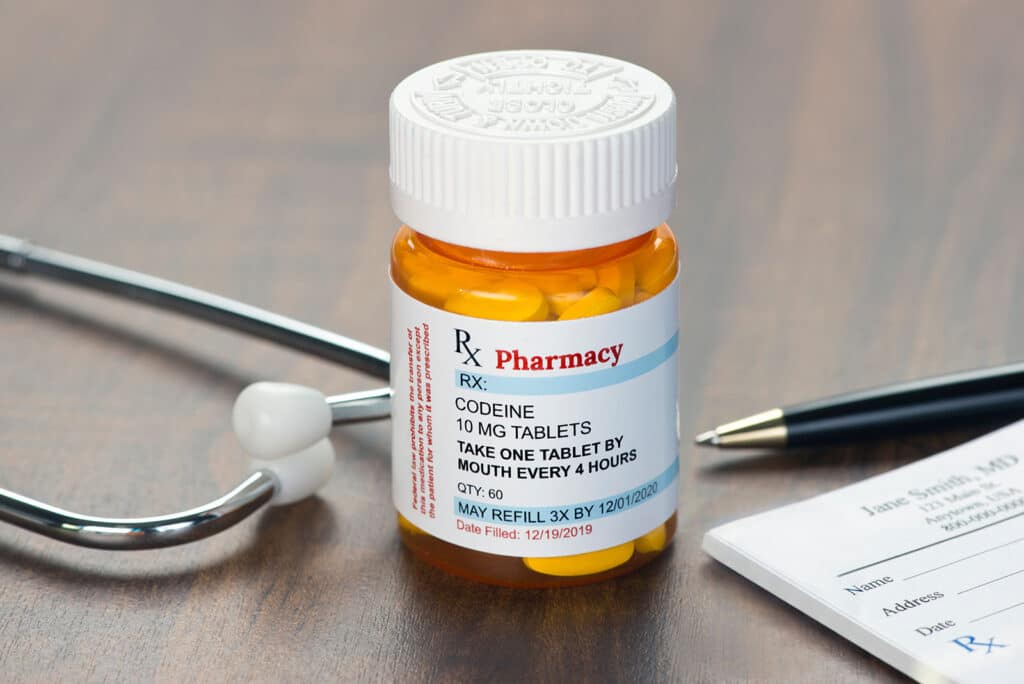Every year, millions of Americans receive prescriptions for what appear to be harmless drugs targeting minor illnesses. Whether it is to treat aches and pains or coughs, these medications are safe when taken as intended. However, some pose potential risks to individuals who may abuse them.
Broncleer is one such product. It is innocuous and effective at low doses, but its usage can quickly get out of hand for some people. This can happen for multiple reasons, including those related to the drug’s effectiveness, its chemical makeup, and factors predisposing users to abuse Broncleer.
This article will cover basic information about Broncleer, the symptoms and effects of abuse, and related topics.
Table of Contents
What Is Broncleer?
Broncleer is a type of prescription cough syrup frequently administered in the United States and around the world. Its main ingredients are codeine and alcohol. Doctors sometimes prescribe codeine as a pain medication, but it also has cough-suppressing effects. The alcohol in the product helps the body to absorb other ingredients more readily, and it may enhance the relaxing impact of the drug.
If taken as prescribed, Broncleer works well to alleviate the urge to cough and help people quickly get over less intense infections and colds. But because it contains codeine, which attaches to opioid receptors in the brain, the soothing effects of Broncleer can tempt patients to misuse it. When someone takes too much Broncleer, takes it too often, or mixes it with other drugs like alcohol, it can lead to severe side effects.
Understanding Codeine
Codeine is in the opioid class of drugs, which places it in the company of more powerful substances like heroin, Vicodin, Oxycontin, Demerol, and hydrocodone. That makes codeine a narcotic. Like other narcotics, codeine derives from a plant in the poppy family.
Despite its relation to drugs with mixed reputations, codeine is one of the most prescribed opioid medications in the world. Treating mild or moderate pain, curing a cough, and helping patients recover from gastrointestinal problems like diarrhea are a few of the most common uses for codeine.
Most patients with a codeine-based prescription like Broncleer can take it appropriately and experience no issues. However, a small percentage of these patients begin a pattern of codeine abuse that can develop into an addiction.

What Is Codeine Abuse?
Because codeine can have pleasurable effects, it will inspire some individuals to use products like Broncleer beyond medical necessity to repeat and sustain those effects. Codeine misuse can mean that someone is taking it in higher doses or more frequently than prescribed. Other forms of abuse include:
- Taking codeine meant for someone else
- Taking it specifically to get high
- Deliberately mixing it with other substances to manage a high
Effects of Codeine Abuse
When individuals disregard the instructions of their doctors while taking codeine, they can experience any number of negative side effects. Some examples of these effects are:
- Nausea
- Confusion
- Constipation
- Weakness
- Drowsiness
- Dry Mouth
- Dizziness
- Reduced blood pressure
- Lack of coordination
- Suppressed respiration
Unpleasant side effects can become severe and even dangerous at very high doses or with frequent ingestion of Broncleer and other codeine drugs. The most threatening possible result of codeine abuse is its effect on respiration. Excessive use can slow breathing or even cause it to stop completely. An overdose of codeine may be fatal, especially when combined with alcohol.
What Is Codeine Addiction?
When someone abuses codeine, their body eventually develops a tolerance for it. That means that the usual doses will have a reduced effect, and you will need to ingest more to get the same pain relief, feelings of relaxation, or high as before.
This growing tolerance can become a dependence on the drug as the body adjusts to its continuous presence. Because the brain is becoming less reactive to the impact of codeine, that leads to a situation where it functions closer to normal when one is on codeine versus when one is not. So, if you stop taking it, you will feel ill whether or not you are over the original cold or sickness. This process is how an addiction forms, even when the drug is as unassuming as Broncleer cough syrup.

Causes of Codeine Addiction
Researchers and medical experts do not perfectly understand the causes of codeine addiction, but many think that several factors can come into play simultaneously to make it more likely. Some risk factors are genetic, some biological, and others are psychological.
Scientists think genetics have a role because one’s risk of becoming addicted to a particular substance can be somewhat predicted by whether closely-related family members have struggled with that addiction before. The genetic factor may underpin a biological reason for the addiction, such as the absence of certain neurotransmitters in the brain, which the drug helps to compensate for. That leads to individuals essentially self-medicating an underlying deficiency but in an uncontrolled and unhealthy way. Similarly, if codeine alleviates any negative feelings stemming from a psychological illness, that also creates a powerful pull to overuse and abuse the drug.
Long-term Effects
When someone maintains an addiction to codeine or continues to abuse it over a long period, they will suffer additional negative impacts beyond just the initial side effects. Resulting in long-term health issues and social problems can include:
- Kidney damage
- Liver damage
- Heightened sensitivity to pain
- Severe depression
- Loss of muscle tone
- Respiratory issues
- Pancreatitis
- Job loss
- Legal and criminal issues
- Distressed or broken relationships
- Homelessness
- Seizures
- Coma
- Death
Codeine Withdrawal
As mentioned above, once someone has begun abusing or become addicted to a codeine-based medication like Broncleer, they can suffer harmful consequences if they suddenly stop. This occurs because they are experiencing withdrawal. The severity depends partly on how long the individual took codeine, but any instance of withdrawal is sure to be unpleasant and painful. The following is a list of possible symptoms of codeine withdrawal.
- Stomach cramps
- Nausea and vomiting
- Muscle spasms
- Extreme drug cravings
- Chills
- Interrupted sleep or inability to sleep
- Hallucinations or delusions
- Thoughts of self-harm or harming others
- Irritability
- Psychosis
- Runny nose and eyes
Treatment Options
When someone is seeking to stop taking a codeine medication such as Broncleer or wants to overcome an addiction, they should always do so with the help of a medical professional. Both medication-assisted treatments and behavioral therapy options exist, and a doctor may choose to use one or both approaches.

With medication-assisted treatment (MAT), a doctor will prescribe one or more alternative medications as a patient reduces their codeine intake. These medicines soften withdrawal symptoms, reduce cravings, and allow patients to wean themselves off codeine more gently.
Certain medications can also prevent Broncleer/codeine from generating euphoric feelings in the brain. The inability to get high off the drug naturally decreases your dependency on it. This dynamic encourages a return to normal and healthy brain chemistry. If all goes well, you are no longer in need of the opiate by the end of the treatment.
Behavioral therapies can work as an alternative to MAT options or work in conjunction with them. Examples of possible approaches include cognitive behavioral therapy, motivational interviewing, and multidimensional family therapy. In cognitive-behavioral therapy, therapists coach patients to recognize the triggers of their drug use. As a result, they can better avoid and manage those situations.
Motivational interviewing is similar – it allows patients to come to terms with how drug use is negatively impacting their lives and helps give them tools and strategies to make beneficial behavioral changes. Finally, multidimensional family therapy works not just with the patient but also with family members to help correct damage to interpersonal dynamics and drug abuse problems at the same time. This form of therapy can be especially advantageous for adolescents with an addiction or issues abusing Broncleer/codeine.
Broncleer Summary
Despite being an opiate-related to some of the most notorious drugs on the planet, doctors worldwide routinely prescribe codeine for a wide range of conditions involving minor aches, pains, and illnesses. It can be highly successful and relatively safe in small doses, yet the effects that make it so great at helping sick individuals feel better also make it likely a few people will misuse it.
Because codeine and alcohol are the two main ingredients in Broncleer, the benefits and risks it offers are approximately identical to other codeine medications. The inclusion of alcohol has the practical application of allowing the medication to work efficiently, but it can also augment the experience of getting a “high” when taking Broncleer. This may make abuse and eventual addiction more likely for some people.
While most patients who receive a prescription for Broncleer experience no issues, it pays to be aware of the signs and symptoms of a problem in case any develop. If you, a friend, or a family member appear to be unwell when taking Broncleer, the best course of action is to seek assistance from a medical professional right away.


